Reflective Essay on Positive Psychology and Self
VerifiedAdded on 2022/12/30
|12
|4412
|7
AI Summary
This reflective essay explores the concepts of positive psychology and self, discussing the impact of positive psychology on personal growth and well-being. It covers topics such as positive psychology in the workplace, mindfulness, character strengths, positive emotions, resilience, and optimistic organizational behavior.
Contribute Materials
Your contribution can guide someone’s learning journey. Share your
documents today.
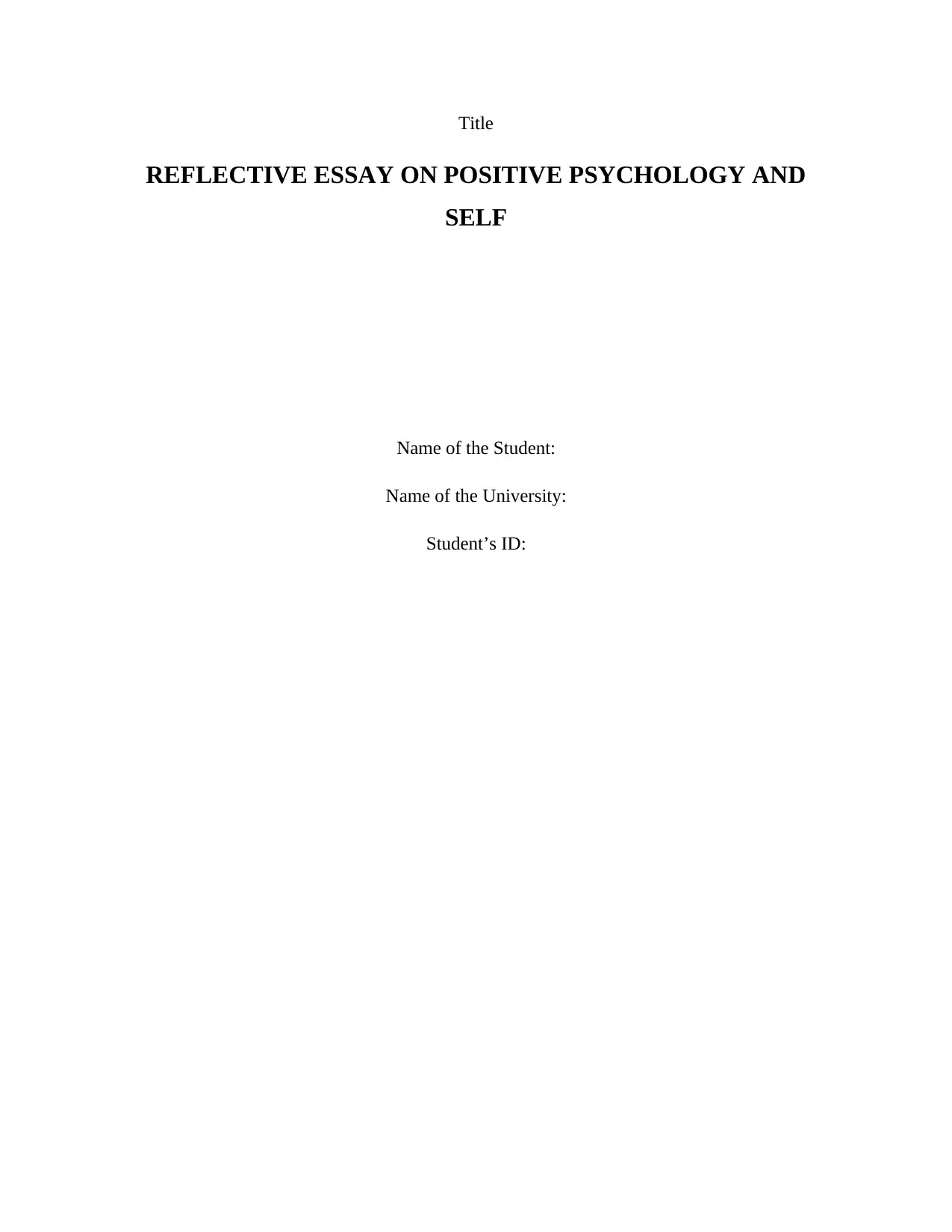
Title
REFLECTIVE ESSAY ON POSITIVE PSYCHOLOGY AND
SELF
Name of the Student:
Name of the University:
Student’s ID:
REFLECTIVE ESSAY ON POSITIVE PSYCHOLOGY AND
SELF
Name of the Student:
Name of the University:
Student’s ID:
Secure Best Marks with AI Grader
Need help grading? Try our AI Grader for instant feedback on your assignments.
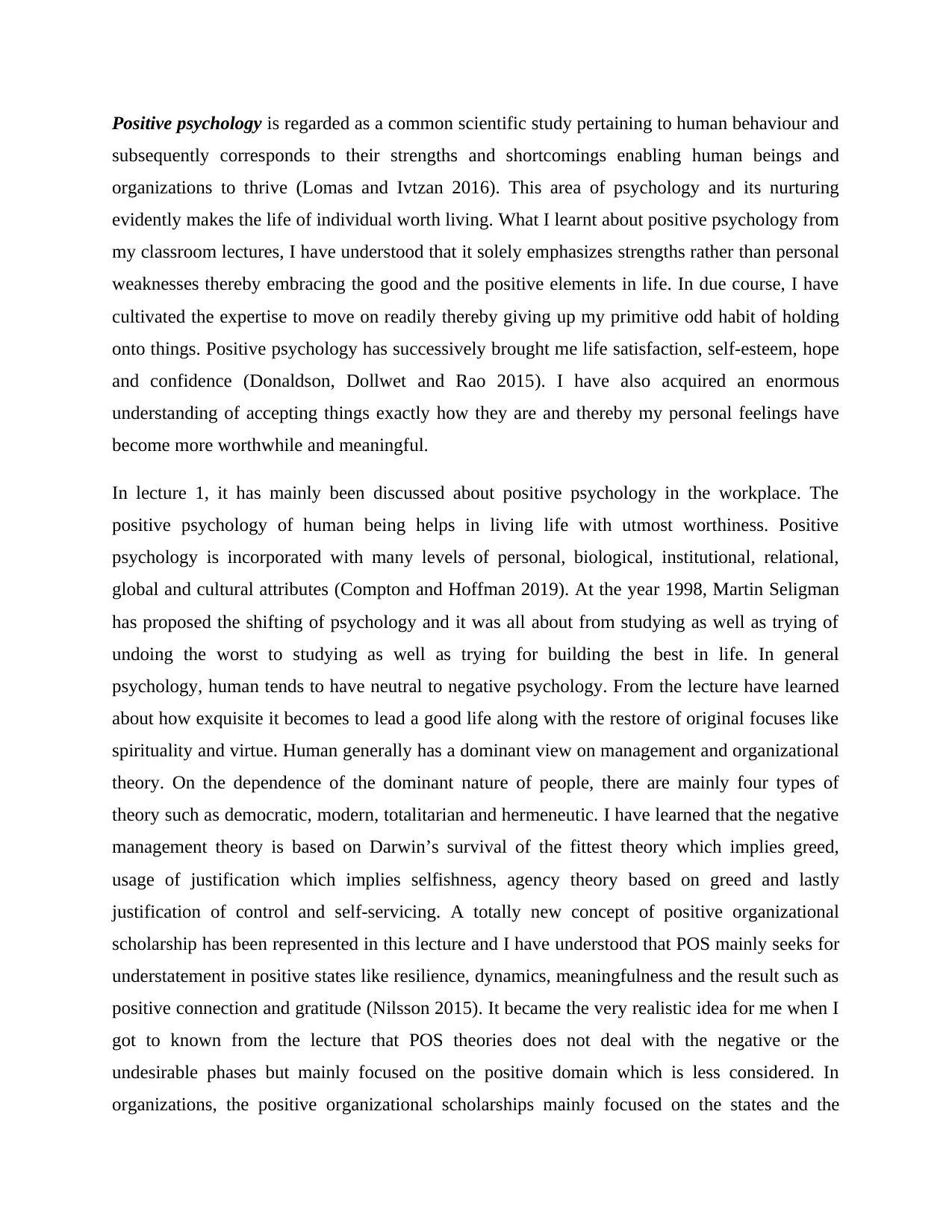
Positive psychology is regarded as a common scientific study pertaining to human behaviour and
subsequently corresponds to their strengths and shortcomings enabling human beings and
organizations to thrive (Lomas and Ivtzan 2016). This area of psychology and its nurturing
evidently makes the life of individual worth living. What I learnt about positive psychology from
my classroom lectures, I have understood that it solely emphasizes strengths rather than personal
weaknesses thereby embracing the good and the positive elements in life. In due course, I have
cultivated the expertise to move on readily thereby giving up my primitive odd habit of holding
onto things. Positive psychology has successively brought me life satisfaction, self-esteem, hope
and confidence (Donaldson, Dollwet and Rao 2015). I have also acquired an enormous
understanding of accepting things exactly how they are and thereby my personal feelings have
become more worthwhile and meaningful.
In lecture 1, it has mainly been discussed about positive psychology in the workplace. The
positive psychology of human being helps in living life with utmost worthiness. Positive
psychology is incorporated with many levels of personal, biological, institutional, relational,
global and cultural attributes (Compton and Hoffman 2019). At the year 1998, Martin Seligman
has proposed the shifting of psychology and it was all about from studying as well as trying of
undoing the worst to studying as well as trying for building the best in life. In general
psychology, human tends to have neutral to negative psychology. From the lecture have learned
about how exquisite it becomes to lead a good life along with the restore of original focuses like
spirituality and virtue. Human generally has a dominant view on management and organizational
theory. On the dependence of the dominant nature of people, there are mainly four types of
theory such as democratic, modern, totalitarian and hermeneutic. I have learned that the negative
management theory is based on Darwin’s survival of the fittest theory which implies greed,
usage of justification which implies selfishness, agency theory based on greed and lastly
justification of control and self-servicing. A totally new concept of positive organizational
scholarship has been represented in this lecture and I have understood that POS mainly seeks for
understatement in positive states like resilience, dynamics, meaningfulness and the result such as
positive connection and gratitude (Nilsson 2015). It became the very realistic idea for me when I
got to known from the lecture that POS theories does not deal with the negative or the
undesirable phases but mainly focused on the positive domain which is less considered. In
organizations, the positive organizational scholarships mainly focused on the states and the
subsequently corresponds to their strengths and shortcomings enabling human beings and
organizations to thrive (Lomas and Ivtzan 2016). This area of psychology and its nurturing
evidently makes the life of individual worth living. What I learnt about positive psychology from
my classroom lectures, I have understood that it solely emphasizes strengths rather than personal
weaknesses thereby embracing the good and the positive elements in life. In due course, I have
cultivated the expertise to move on readily thereby giving up my primitive odd habit of holding
onto things. Positive psychology has successively brought me life satisfaction, self-esteem, hope
and confidence (Donaldson, Dollwet and Rao 2015). I have also acquired an enormous
understanding of accepting things exactly how they are and thereby my personal feelings have
become more worthwhile and meaningful.
In lecture 1, it has mainly been discussed about positive psychology in the workplace. The
positive psychology of human being helps in living life with utmost worthiness. Positive
psychology is incorporated with many levels of personal, biological, institutional, relational,
global and cultural attributes (Compton and Hoffman 2019). At the year 1998, Martin Seligman
has proposed the shifting of psychology and it was all about from studying as well as trying of
undoing the worst to studying as well as trying for building the best in life. In general
psychology, human tends to have neutral to negative psychology. From the lecture have learned
about how exquisite it becomes to lead a good life along with the restore of original focuses like
spirituality and virtue. Human generally has a dominant view on management and organizational
theory. On the dependence of the dominant nature of people, there are mainly four types of
theory such as democratic, modern, totalitarian and hermeneutic. I have learned that the negative
management theory is based on Darwin’s survival of the fittest theory which implies greed,
usage of justification which implies selfishness, agency theory based on greed and lastly
justification of control and self-servicing. A totally new concept of positive organizational
scholarship has been represented in this lecture and I have understood that POS mainly seeks for
understatement in positive states like resilience, dynamics, meaningfulness and the result such as
positive connection and gratitude (Nilsson 2015). It became the very realistic idea for me when I
got to known from the lecture that POS theories does not deal with the negative or the
undesirable phases but mainly focused on the positive domain which is less considered. In
organizations, the positive organizational scholarships mainly focused on the states and the
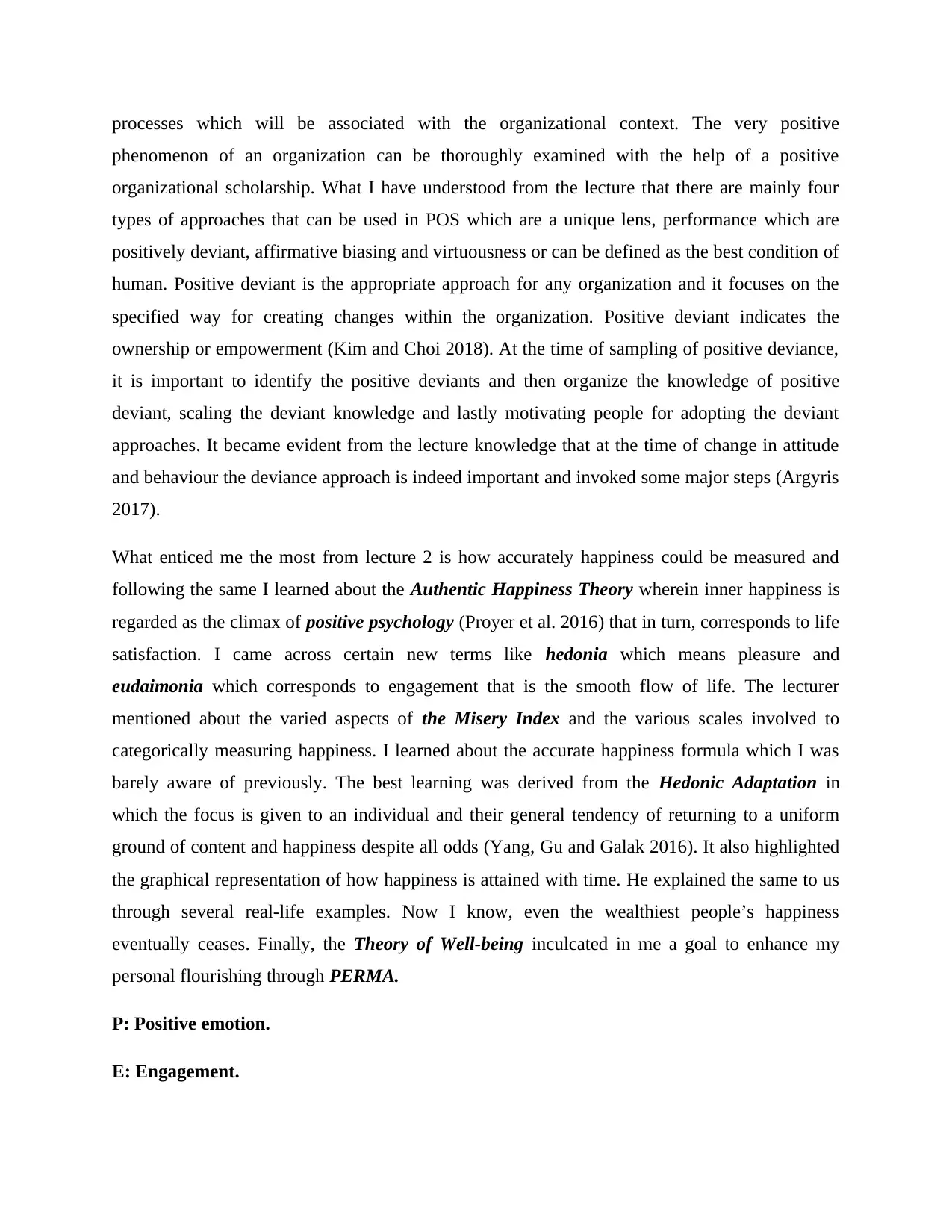
processes which will be associated with the organizational context. The very positive
phenomenon of an organization can be thoroughly examined with the help of a positive
organizational scholarship. What I have understood from the lecture that there are mainly four
types of approaches that can be used in POS which are a unique lens, performance which are
positively deviant, affirmative biasing and virtuousness or can be defined as the best condition of
human. Positive deviant is the appropriate approach for any organization and it focuses on the
specified way for creating changes within the organization. Positive deviant indicates the
ownership or empowerment (Kim and Choi 2018). At the time of sampling of positive deviance,
it is important to identify the positive deviants and then organize the knowledge of positive
deviant, scaling the deviant knowledge and lastly motivating people for adopting the deviant
approaches. It became evident from the lecture knowledge that at the time of change in attitude
and behaviour the deviance approach is indeed important and invoked some major steps (Argyris
2017).
What enticed me the most from lecture 2 is how accurately happiness could be measured and
following the same I learned about the Authentic Happiness Theory wherein inner happiness is
regarded as the climax of positive psychology (Proyer et al. 2016) that in turn, corresponds to life
satisfaction. I came across certain new terms like hedonia which means pleasure and
eudaimonia which corresponds to engagement that is the smooth flow of life. The lecturer
mentioned about the varied aspects of the Misery Index and the various scales involved to
categorically measuring happiness. I learned about the accurate happiness formula which I was
barely aware of previously. The best learning was derived from the Hedonic Adaptation in
which the focus is given to an individual and their general tendency of returning to a uniform
ground of content and happiness despite all odds (Yang, Gu and Galak 2016). It also highlighted
the graphical representation of how happiness is attained with time. He explained the same to us
through several real-life examples. Now I know, even the wealthiest people’s happiness
eventually ceases. Finally, the Theory of Well-being inculcated in me a goal to enhance my
personal flourishing through PERMA.
P: Positive emotion.
E: Engagement.
phenomenon of an organization can be thoroughly examined with the help of a positive
organizational scholarship. What I have understood from the lecture that there are mainly four
types of approaches that can be used in POS which are a unique lens, performance which are
positively deviant, affirmative biasing and virtuousness or can be defined as the best condition of
human. Positive deviant is the appropriate approach for any organization and it focuses on the
specified way for creating changes within the organization. Positive deviant indicates the
ownership or empowerment (Kim and Choi 2018). At the time of sampling of positive deviance,
it is important to identify the positive deviants and then organize the knowledge of positive
deviant, scaling the deviant knowledge and lastly motivating people for adopting the deviant
approaches. It became evident from the lecture knowledge that at the time of change in attitude
and behaviour the deviance approach is indeed important and invoked some major steps (Argyris
2017).
What enticed me the most from lecture 2 is how accurately happiness could be measured and
following the same I learned about the Authentic Happiness Theory wherein inner happiness is
regarded as the climax of positive psychology (Proyer et al. 2016) that in turn, corresponds to life
satisfaction. I came across certain new terms like hedonia which means pleasure and
eudaimonia which corresponds to engagement that is the smooth flow of life. The lecturer
mentioned about the varied aspects of the Misery Index and the various scales involved to
categorically measuring happiness. I learned about the accurate happiness formula which I was
barely aware of previously. The best learning was derived from the Hedonic Adaptation in
which the focus is given to an individual and their general tendency of returning to a uniform
ground of content and happiness despite all odds (Yang, Gu and Galak 2016). It also highlighted
the graphical representation of how happiness is attained with time. He explained the same to us
through several real-life examples. Now I know, even the wealthiest people’s happiness
eventually ceases. Finally, the Theory of Well-being inculcated in me a goal to enhance my
personal flourishing through PERMA.
P: Positive emotion.
E: Engagement.
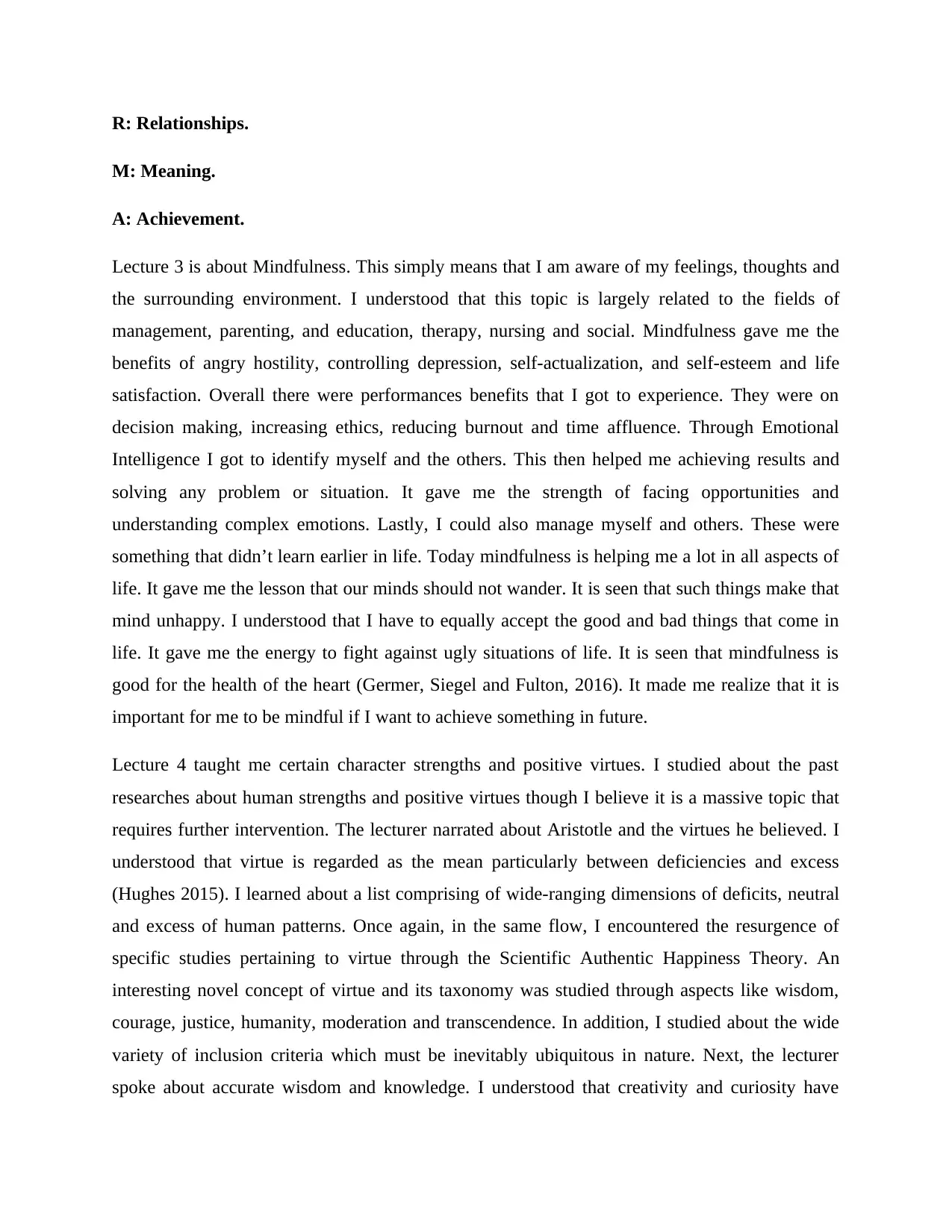
R: Relationships.
M: Meaning.
A: Achievement.
Lecture 3 is about Mindfulness. This simply means that I am aware of my feelings, thoughts and
the surrounding environment. I understood that this topic is largely related to the fields of
management, parenting, and education, therapy, nursing and social. Mindfulness gave me the
benefits of angry hostility, controlling depression, self-actualization, and self-esteem and life
satisfaction. Overall there were performances benefits that I got to experience. They were on
decision making, increasing ethics, reducing burnout and time affluence. Through Emotional
Intelligence I got to identify myself and the others. This then helped me achieving results and
solving any problem or situation. It gave me the strength of facing opportunities and
understanding complex emotions. Lastly, I could also manage myself and others. These were
something that didn’t learn earlier in life. Today mindfulness is helping me a lot in all aspects of
life. It gave me the lesson that our minds should not wander. It is seen that such things make that
mind unhappy. I understood that I have to equally accept the good and bad things that come in
life. It gave me the energy to fight against ugly situations of life. It is seen that mindfulness is
good for the health of the heart (Germer, Siegel and Fulton, 2016). It made me realize that it is
important for me to be mindful if I want to achieve something in future.
Lecture 4 taught me certain character strengths and positive virtues. I studied about the past
researches about human strengths and positive virtues though I believe it is a massive topic that
requires further intervention. The lecturer narrated about Aristotle and the virtues he believed. I
understood that virtue is regarded as the mean particularly between deficiencies and excess
(Hughes 2015). I learned about a list comprising of wide-ranging dimensions of deficits, neutral
and excess of human patterns. Once again, in the same flow, I encountered the resurgence of
specific studies pertaining to virtue through the Scientific Authentic Happiness Theory. An
interesting novel concept of virtue and its taxonomy was studied through aspects like wisdom,
courage, justice, humanity, moderation and transcendence. In addition, I studied about the wide
variety of inclusion criteria which must be inevitably ubiquitous in nature. Next, the lecturer
spoke about accurate wisdom and knowledge. I understood that creativity and curiosity have
M: Meaning.
A: Achievement.
Lecture 3 is about Mindfulness. This simply means that I am aware of my feelings, thoughts and
the surrounding environment. I understood that this topic is largely related to the fields of
management, parenting, and education, therapy, nursing and social. Mindfulness gave me the
benefits of angry hostility, controlling depression, self-actualization, and self-esteem and life
satisfaction. Overall there were performances benefits that I got to experience. They were on
decision making, increasing ethics, reducing burnout and time affluence. Through Emotional
Intelligence I got to identify myself and the others. This then helped me achieving results and
solving any problem or situation. It gave me the strength of facing opportunities and
understanding complex emotions. Lastly, I could also manage myself and others. These were
something that didn’t learn earlier in life. Today mindfulness is helping me a lot in all aspects of
life. It gave me the lesson that our minds should not wander. It is seen that such things make that
mind unhappy. I understood that I have to equally accept the good and bad things that come in
life. It gave me the energy to fight against ugly situations of life. It is seen that mindfulness is
good for the health of the heart (Germer, Siegel and Fulton, 2016). It made me realize that it is
important for me to be mindful if I want to achieve something in future.
Lecture 4 taught me certain character strengths and positive virtues. I studied about the past
researches about human strengths and positive virtues though I believe it is a massive topic that
requires further intervention. The lecturer narrated about Aristotle and the virtues he believed. I
understood that virtue is regarded as the mean particularly between deficiencies and excess
(Hughes 2015). I learned about a list comprising of wide-ranging dimensions of deficits, neutral
and excess of human patterns. Once again, in the same flow, I encountered the resurgence of
specific studies pertaining to virtue through the Scientific Authentic Happiness Theory. An
interesting novel concept of virtue and its taxonomy was studied through aspects like wisdom,
courage, justice, humanity, moderation and transcendence. In addition, I studied about the wide
variety of inclusion criteria which must be inevitably ubiquitous in nature. Next, the lecturer
spoke about accurate wisdom and knowledge. I understood that creativity and curiosity have
Secure Best Marks with AI Grader
Need help grading? Try our AI Grader for instant feedback on your assignments.
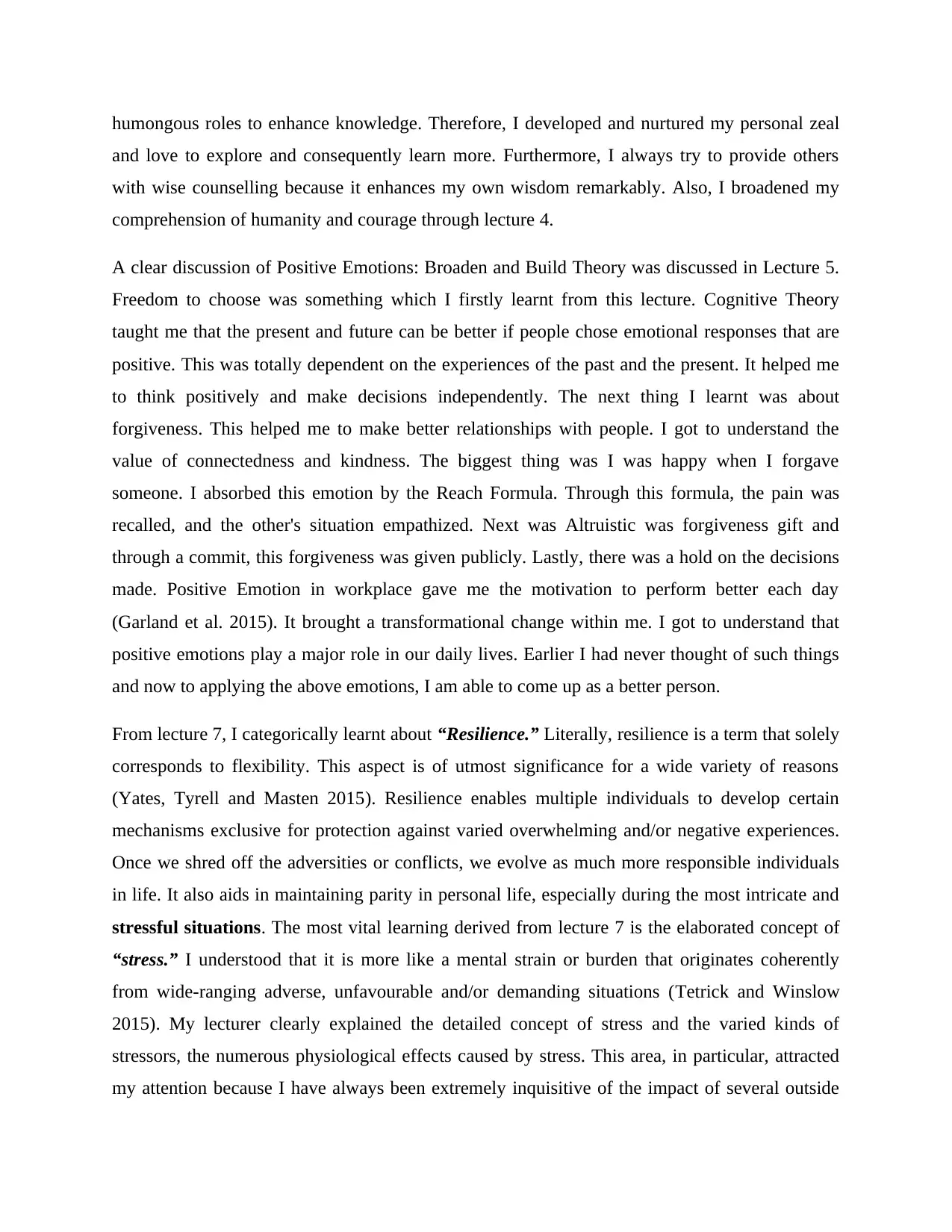
humongous roles to enhance knowledge. Therefore, I developed and nurtured my personal zeal
and love to explore and consequently learn more. Furthermore, I always try to provide others
with wise counselling because it enhances my own wisdom remarkably. Also, I broadened my
comprehension of humanity and courage through lecture 4.
A clear discussion of Positive Emotions: Broaden and Build Theory was discussed in Lecture 5.
Freedom to choose was something which I firstly learnt from this lecture. Cognitive Theory
taught me that the present and future can be better if people chose emotional responses that are
positive. This was totally dependent on the experiences of the past and the present. It helped me
to think positively and make decisions independently. The next thing I learnt was about
forgiveness. This helped me to make better relationships with people. I got to understand the
value of connectedness and kindness. The biggest thing was I was happy when I forgave
someone. I absorbed this emotion by the Reach Formula. Through this formula, the pain was
recalled, and the other's situation empathized. Next was Altruistic was forgiveness gift and
through a commit, this forgiveness was given publicly. Lastly, there was a hold on the decisions
made. Positive Emotion in workplace gave me the motivation to perform better each day
(Garland et al. 2015). It brought a transformational change within me. I got to understand that
positive emotions play a major role in our daily lives. Earlier I had never thought of such things
and now to applying the above emotions, I am able to come up as a better person.
From lecture 7, I categorically learnt about “Resilience.” Literally, resilience is a term that solely
corresponds to flexibility. This aspect is of utmost significance for a wide variety of reasons
(Yates, Tyrell and Masten 2015). Resilience enables multiple individuals to develop certain
mechanisms exclusive for protection against varied overwhelming and/or negative experiences.
Once we shred off the adversities or conflicts, we evolve as much more responsible individuals
in life. It also aids in maintaining parity in personal life, especially during the most intricate and
stressful situations. The most vital learning derived from lecture 7 is the elaborated concept of
“stress.” I understood that it is more like a mental strain or burden that originates coherently
from wide-ranging adverse, unfavourable and/or demanding situations (Tetrick and Winslow
2015). My lecturer clearly explained the detailed concept of stress and the varied kinds of
stressors, the numerous physiological effects caused by stress. This area, in particular, attracted
my attention because I have always been extremely inquisitive of the impact of several outside
and love to explore and consequently learn more. Furthermore, I always try to provide others
with wise counselling because it enhances my own wisdom remarkably. Also, I broadened my
comprehension of humanity and courage through lecture 4.
A clear discussion of Positive Emotions: Broaden and Build Theory was discussed in Lecture 5.
Freedom to choose was something which I firstly learnt from this lecture. Cognitive Theory
taught me that the present and future can be better if people chose emotional responses that are
positive. This was totally dependent on the experiences of the past and the present. It helped me
to think positively and make decisions independently. The next thing I learnt was about
forgiveness. This helped me to make better relationships with people. I got to understand the
value of connectedness and kindness. The biggest thing was I was happy when I forgave
someone. I absorbed this emotion by the Reach Formula. Through this formula, the pain was
recalled, and the other's situation empathized. Next was Altruistic was forgiveness gift and
through a commit, this forgiveness was given publicly. Lastly, there was a hold on the decisions
made. Positive Emotion in workplace gave me the motivation to perform better each day
(Garland et al. 2015). It brought a transformational change within me. I got to understand that
positive emotions play a major role in our daily lives. Earlier I had never thought of such things
and now to applying the above emotions, I am able to come up as a better person.
From lecture 7, I categorically learnt about “Resilience.” Literally, resilience is a term that solely
corresponds to flexibility. This aspect is of utmost significance for a wide variety of reasons
(Yates, Tyrell and Masten 2015). Resilience enables multiple individuals to develop certain
mechanisms exclusive for protection against varied overwhelming and/or negative experiences.
Once we shred off the adversities or conflicts, we evolve as much more responsible individuals
in life. It also aids in maintaining parity in personal life, especially during the most intricate and
stressful situations. The most vital learning derived from lecture 7 is the elaborated concept of
“stress.” I understood that it is more like a mental strain or burden that originates coherently
from wide-ranging adverse, unfavourable and/or demanding situations (Tetrick and Winslow
2015). My lecturer clearly explained the detailed concept of stress and the varied kinds of
stressors, the numerous physiological effects caused by stress. This area, in particular, attracted
my attention because I have always been extremely inquisitive of the impact of several outside
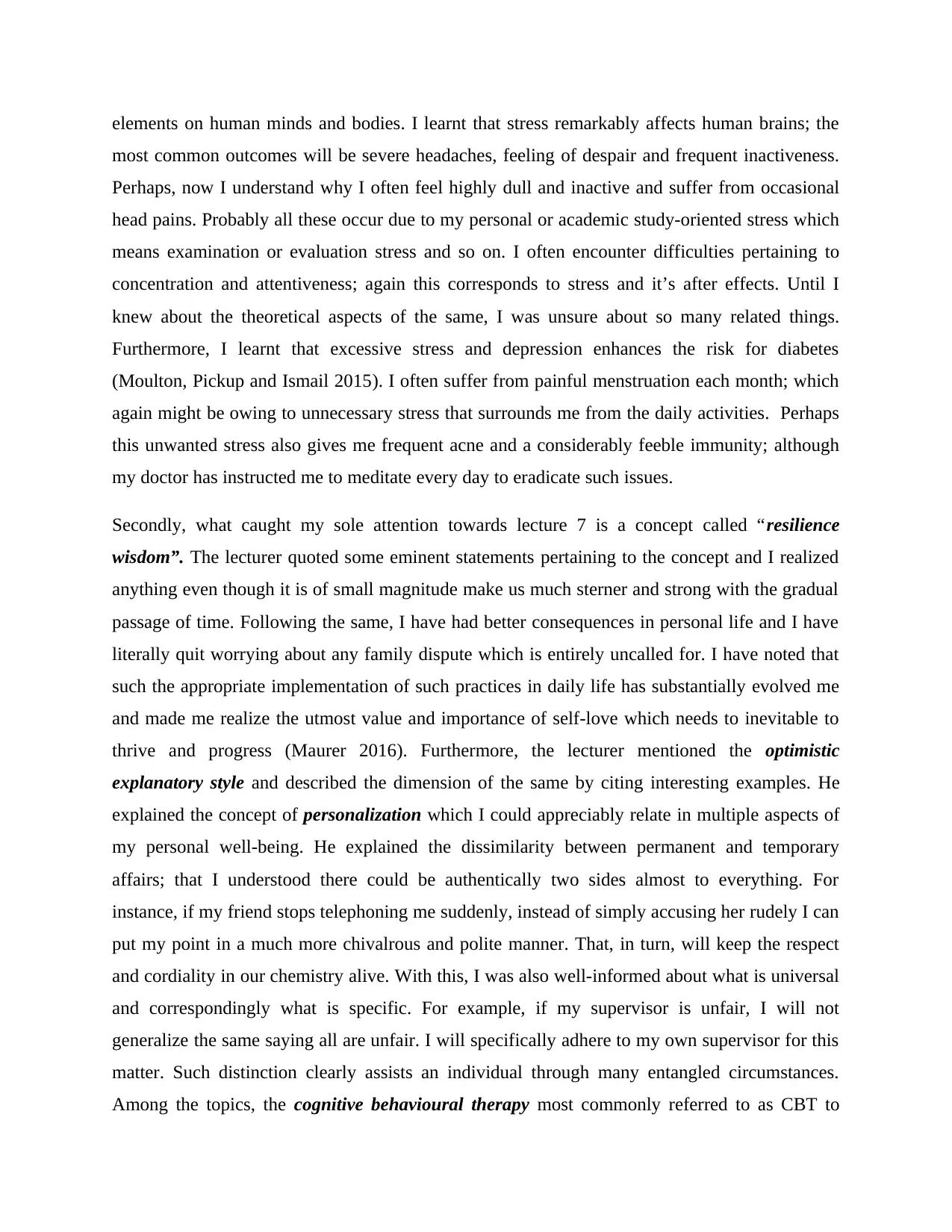
elements on human minds and bodies. I learnt that stress remarkably affects human brains; the
most common outcomes will be severe headaches, feeling of despair and frequent inactiveness.
Perhaps, now I understand why I often feel highly dull and inactive and suffer from occasional
head pains. Probably all these occur due to my personal or academic study-oriented stress which
means examination or evaluation stress and so on. I often encounter difficulties pertaining to
concentration and attentiveness; again this corresponds to stress and it’s after effects. Until I
knew about the theoretical aspects of the same, I was unsure about so many related things.
Furthermore, I learnt that excessive stress and depression enhances the risk for diabetes
(Moulton, Pickup and Ismail 2015). I often suffer from painful menstruation each month; which
again might be owing to unnecessary stress that surrounds me from the daily activities. Perhaps
this unwanted stress also gives me frequent acne and a considerably feeble immunity; although
my doctor has instructed me to meditate every day to eradicate such issues.
Secondly, what caught my sole attention towards lecture 7 is a concept called “resilience
wisdom”. The lecturer quoted some eminent statements pertaining to the concept and I realized
anything even though it is of small magnitude make us much sterner and strong with the gradual
passage of time. Following the same, I have had better consequences in personal life and I have
literally quit worrying about any family dispute which is entirely uncalled for. I have noted that
such the appropriate implementation of such practices in daily life has substantially evolved me
and made me realize the utmost value and importance of self-love which needs to inevitable to
thrive and progress (Maurer 2016). Furthermore, the lecturer mentioned the optimistic
explanatory style and described the dimension of the same by citing interesting examples. He
explained the concept of personalization which I could appreciably relate in multiple aspects of
my personal well-being. He explained the dissimilarity between permanent and temporary
affairs; that I understood there could be authentically two sides almost to everything. For
instance, if my friend stops telephoning me suddenly, instead of simply accusing her rudely I can
put my point in a much more chivalrous and polite manner. That, in turn, will keep the respect
and cordiality in our chemistry alive. With this, I was also well-informed about what is universal
and correspondingly what is specific. For example, if my supervisor is unfair, I will not
generalize the same saying all are unfair. I will specifically adhere to my own supervisor for this
matter. Such distinction clearly assists an individual through many entangled circumstances.
Among the topics, the cognitive behavioural therapy most commonly referred to as CBT to
most common outcomes will be severe headaches, feeling of despair and frequent inactiveness.
Perhaps, now I understand why I often feel highly dull and inactive and suffer from occasional
head pains. Probably all these occur due to my personal or academic study-oriented stress which
means examination or evaluation stress and so on. I often encounter difficulties pertaining to
concentration and attentiveness; again this corresponds to stress and it’s after effects. Until I
knew about the theoretical aspects of the same, I was unsure about so many related things.
Furthermore, I learnt that excessive stress and depression enhances the risk for diabetes
(Moulton, Pickup and Ismail 2015). I often suffer from painful menstruation each month; which
again might be owing to unnecessary stress that surrounds me from the daily activities. Perhaps
this unwanted stress also gives me frequent acne and a considerably feeble immunity; although
my doctor has instructed me to meditate every day to eradicate such issues.
Secondly, what caught my sole attention towards lecture 7 is a concept called “resilience
wisdom”. The lecturer quoted some eminent statements pertaining to the concept and I realized
anything even though it is of small magnitude make us much sterner and strong with the gradual
passage of time. Following the same, I have had better consequences in personal life and I have
literally quit worrying about any family dispute which is entirely uncalled for. I have noted that
such the appropriate implementation of such practices in daily life has substantially evolved me
and made me realize the utmost value and importance of self-love which needs to inevitable to
thrive and progress (Maurer 2016). Furthermore, the lecturer mentioned the optimistic
explanatory style and described the dimension of the same by citing interesting examples. He
explained the concept of personalization which I could appreciably relate in multiple aspects of
my personal well-being. He explained the dissimilarity between permanent and temporary
affairs; that I understood there could be authentically two sides almost to everything. For
instance, if my friend stops telephoning me suddenly, instead of simply accusing her rudely I can
put my point in a much more chivalrous and polite manner. That, in turn, will keep the respect
and cordiality in our chemistry alive. With this, I was also well-informed about what is universal
and correspondingly what is specific. For example, if my supervisor is unfair, I will not
generalize the same saying all are unfair. I will specifically adhere to my own supervisor for this
matter. Such distinction clearly assists an individual through many entangled circumstances.
Among the topics, the cognitive behavioural therapy most commonly referred to as CBT to
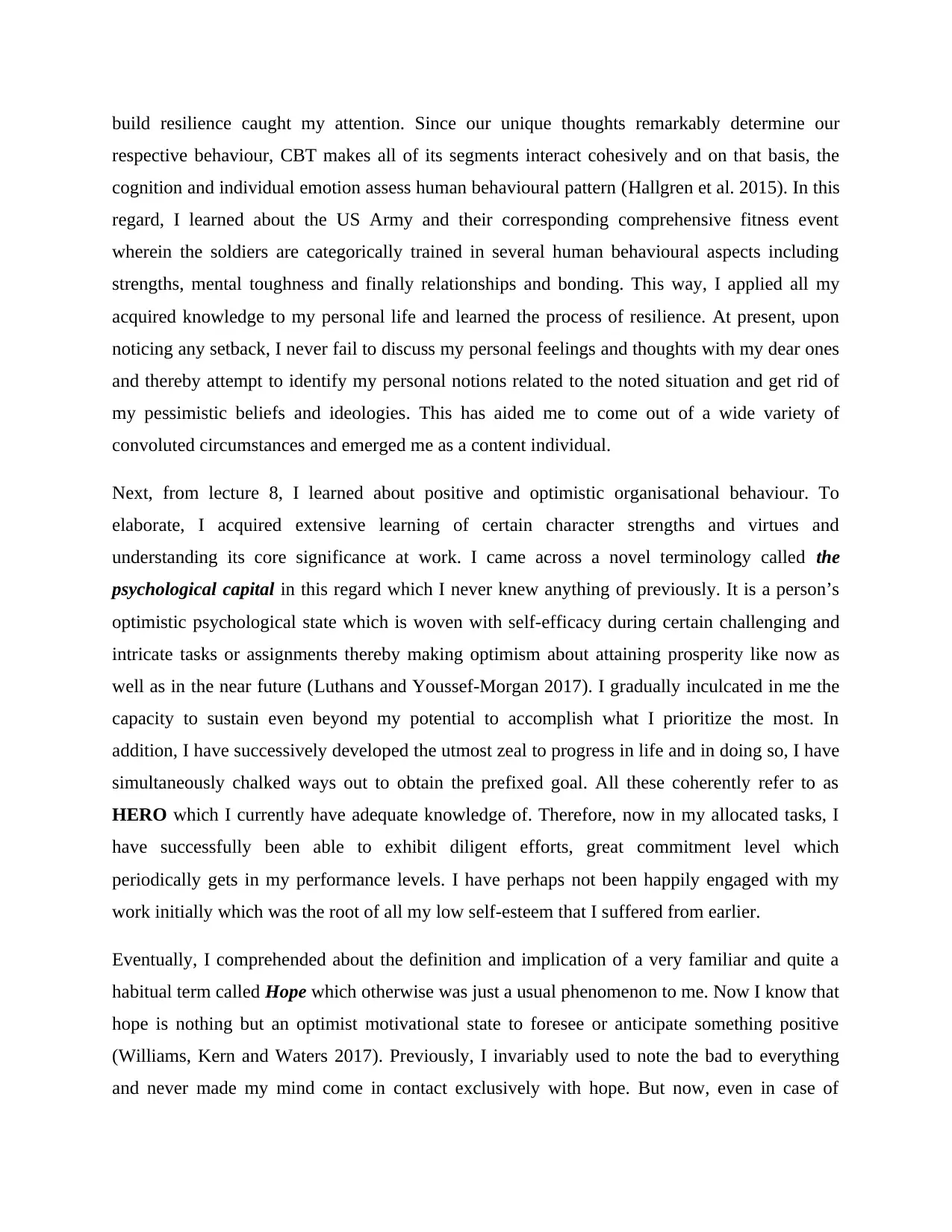
build resilience caught my attention. Since our unique thoughts remarkably determine our
respective behaviour, CBT makes all of its segments interact cohesively and on that basis, the
cognition and individual emotion assess human behavioural pattern (Hallgren et al. 2015). In this
regard, I learned about the US Army and their corresponding comprehensive fitness event
wherein the soldiers are categorically trained in several human behavioural aspects including
strengths, mental toughness and finally relationships and bonding. This way, I applied all my
acquired knowledge to my personal life and learned the process of resilience. At present, upon
noticing any setback, I never fail to discuss my personal feelings and thoughts with my dear ones
and thereby attempt to identify my personal notions related to the noted situation and get rid of
my pessimistic beliefs and ideologies. This has aided me to come out of a wide variety of
convoluted circumstances and emerged me as a content individual.
Next, from lecture 8, I learned about positive and optimistic organisational behaviour. To
elaborate, I acquired extensive learning of certain character strengths and virtues and
understanding its core significance at work. I came across a novel terminology called the
psychological capital in this regard which I never knew anything of previously. It is a person’s
optimistic psychological state which is woven with self-efficacy during certain challenging and
intricate tasks or assignments thereby making optimism about attaining prosperity like now as
well as in the near future (Luthans and Youssef-Morgan 2017). I gradually inculcated in me the
capacity to sustain even beyond my potential to accomplish what I prioritize the most. In
addition, I have successively developed the utmost zeal to progress in life and in doing so, I have
simultaneously chalked ways out to obtain the prefixed goal. All these coherently refer to as
HERO which I currently have adequate knowledge of. Therefore, now in my allocated tasks, I
have successfully been able to exhibit diligent efforts, great commitment level which
periodically gets in my performance levels. I have perhaps not been happily engaged with my
work initially which was the root of all my low self-esteem that I suffered from earlier.
Eventually, I comprehended about the definition and implication of a very familiar and quite a
habitual term called Hope which otherwise was just a usual phenomenon to me. Now I know that
hope is nothing but an optimist motivational state to foresee or anticipate something positive
(Williams, Kern and Waters 2017). Previously, I invariably used to note the bad to everything
and never made my mind come in contact exclusively with hope. But now, even in case of
respective behaviour, CBT makes all of its segments interact cohesively and on that basis, the
cognition and individual emotion assess human behavioural pattern (Hallgren et al. 2015). In this
regard, I learned about the US Army and their corresponding comprehensive fitness event
wherein the soldiers are categorically trained in several human behavioural aspects including
strengths, mental toughness and finally relationships and bonding. This way, I applied all my
acquired knowledge to my personal life and learned the process of resilience. At present, upon
noticing any setback, I never fail to discuss my personal feelings and thoughts with my dear ones
and thereby attempt to identify my personal notions related to the noted situation and get rid of
my pessimistic beliefs and ideologies. This has aided me to come out of a wide variety of
convoluted circumstances and emerged me as a content individual.
Next, from lecture 8, I learned about positive and optimistic organisational behaviour. To
elaborate, I acquired extensive learning of certain character strengths and virtues and
understanding its core significance at work. I came across a novel terminology called the
psychological capital in this regard which I never knew anything of previously. It is a person’s
optimistic psychological state which is woven with self-efficacy during certain challenging and
intricate tasks or assignments thereby making optimism about attaining prosperity like now as
well as in the near future (Luthans and Youssef-Morgan 2017). I gradually inculcated in me the
capacity to sustain even beyond my potential to accomplish what I prioritize the most. In
addition, I have successively developed the utmost zeal to progress in life and in doing so, I have
simultaneously chalked ways out to obtain the prefixed goal. All these coherently refer to as
HERO which I currently have adequate knowledge of. Therefore, now in my allocated tasks, I
have successfully been able to exhibit diligent efforts, great commitment level which
periodically gets in my performance levels. I have perhaps not been happily engaged with my
work initially which was the root of all my low self-esteem that I suffered from earlier.
Eventually, I comprehended about the definition and implication of a very familiar and quite a
habitual term called Hope which otherwise was just a usual phenomenon to me. Now I know that
hope is nothing but an optimist motivational state to foresee or anticipate something positive
(Williams, Kern and Waters 2017). Previously, I invariably used to note the bad to everything
and never made my mind come in contact exclusively with hope. But now, even in case of
Paraphrase This Document
Need a fresh take? Get an instant paraphrase of this document with our AI Paraphraser
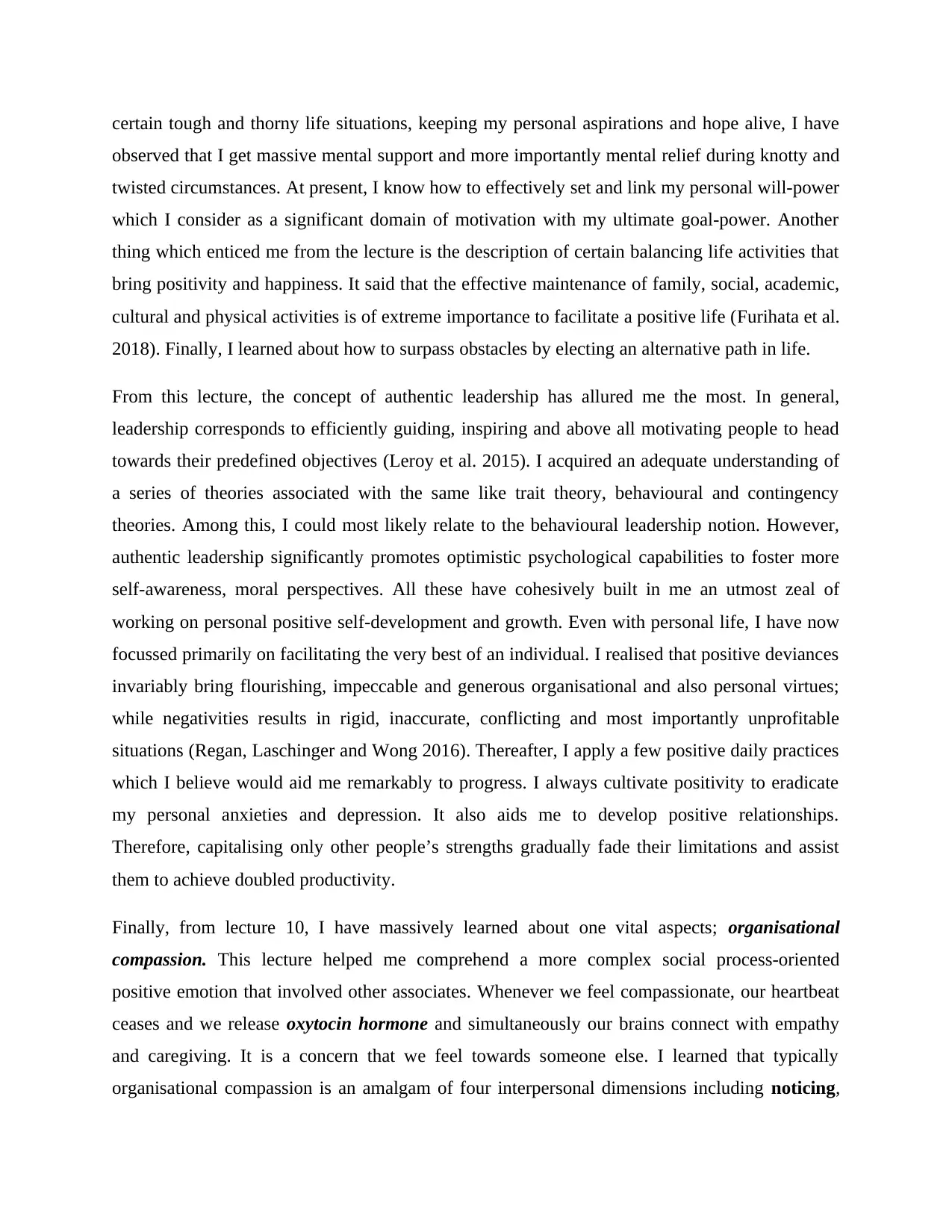
certain tough and thorny life situations, keeping my personal aspirations and hope alive, I have
observed that I get massive mental support and more importantly mental relief during knotty and
twisted circumstances. At present, I know how to effectively set and link my personal will-power
which I consider as a significant domain of motivation with my ultimate goal-power. Another
thing which enticed me from the lecture is the description of certain balancing life activities that
bring positivity and happiness. It said that the effective maintenance of family, social, academic,
cultural and physical activities is of extreme importance to facilitate a positive life (Furihata et al.
2018). Finally, I learned about how to surpass obstacles by electing an alternative path in life.
From this lecture, the concept of authentic leadership has allured me the most. In general,
leadership corresponds to efficiently guiding, inspiring and above all motivating people to head
towards their predefined objectives (Leroy et al. 2015). I acquired an adequate understanding of
a series of theories associated with the same like trait theory, behavioural and contingency
theories. Among this, I could most likely relate to the behavioural leadership notion. However,
authentic leadership significantly promotes optimistic psychological capabilities to foster more
self-awareness, moral perspectives. All these have cohesively built in me an utmost zeal of
working on personal positive self-development and growth. Even with personal life, I have now
focussed primarily on facilitating the very best of an individual. I realised that positive deviances
invariably bring flourishing, impeccable and generous organisational and also personal virtues;
while negativities results in rigid, inaccurate, conflicting and most importantly unprofitable
situations (Regan, Laschinger and Wong 2016). Thereafter, I apply a few positive daily practices
which I believe would aid me remarkably to progress. I always cultivate positivity to eradicate
my personal anxieties and depression. It also aids me to develop positive relationships.
Therefore, capitalising only other people’s strengths gradually fade their limitations and assist
them to achieve doubled productivity.
Finally, from lecture 10, I have massively learned about one vital aspects; organisational
compassion. This lecture helped me comprehend a more complex social process-oriented
positive emotion that involved other associates. Whenever we feel compassionate, our heartbeat
ceases and we release oxytocin hormone and simultaneously our brains connect with empathy
and caregiving. It is a concern that we feel towards someone else. I learned that typically
organisational compassion is an amalgam of four interpersonal dimensions including noticing,
observed that I get massive mental support and more importantly mental relief during knotty and
twisted circumstances. At present, I know how to effectively set and link my personal will-power
which I consider as a significant domain of motivation with my ultimate goal-power. Another
thing which enticed me from the lecture is the description of certain balancing life activities that
bring positivity and happiness. It said that the effective maintenance of family, social, academic,
cultural and physical activities is of extreme importance to facilitate a positive life (Furihata et al.
2018). Finally, I learned about how to surpass obstacles by electing an alternative path in life.
From this lecture, the concept of authentic leadership has allured me the most. In general,
leadership corresponds to efficiently guiding, inspiring and above all motivating people to head
towards their predefined objectives (Leroy et al. 2015). I acquired an adequate understanding of
a series of theories associated with the same like trait theory, behavioural and contingency
theories. Among this, I could most likely relate to the behavioural leadership notion. However,
authentic leadership significantly promotes optimistic psychological capabilities to foster more
self-awareness, moral perspectives. All these have cohesively built in me an utmost zeal of
working on personal positive self-development and growth. Even with personal life, I have now
focussed primarily on facilitating the very best of an individual. I realised that positive deviances
invariably bring flourishing, impeccable and generous organisational and also personal virtues;
while negativities results in rigid, inaccurate, conflicting and most importantly unprofitable
situations (Regan, Laschinger and Wong 2016). Thereafter, I apply a few positive daily practices
which I believe would aid me remarkably to progress. I always cultivate positivity to eradicate
my personal anxieties and depression. It also aids me to develop positive relationships.
Therefore, capitalising only other people’s strengths gradually fade their limitations and assist
them to achieve doubled productivity.
Finally, from lecture 10, I have massively learned about one vital aspects; organisational
compassion. This lecture helped me comprehend a more complex social process-oriented
positive emotion that involved other associates. Whenever we feel compassionate, our heartbeat
ceases and we release oxytocin hormone and simultaneously our brains connect with empathy
and caregiving. It is a concern that we feel towards someone else. I learned that typically
organisational compassion is an amalgam of four interpersonal dimensions including noticing,
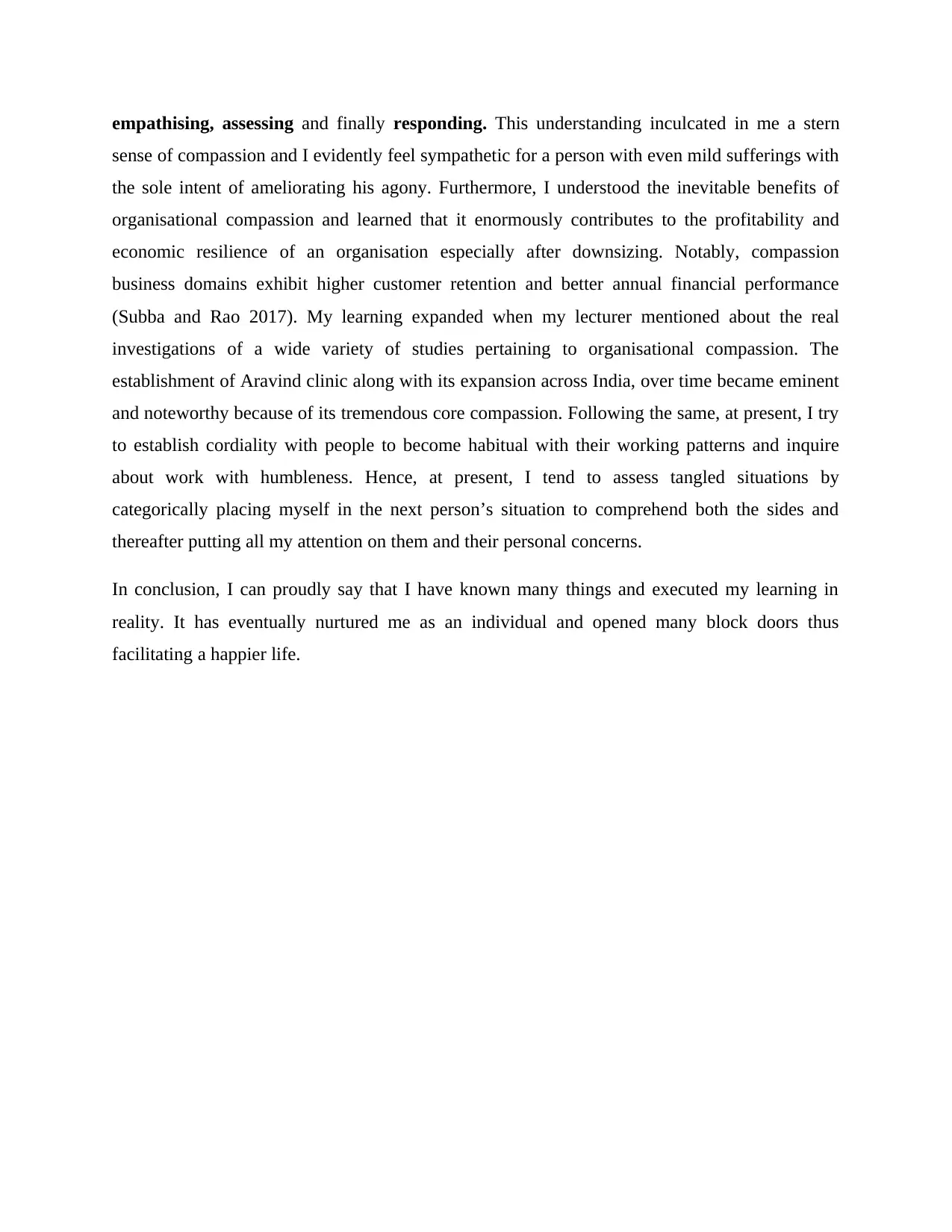
empathising, assessing and finally responding. This understanding inculcated in me a stern
sense of compassion and I evidently feel sympathetic for a person with even mild sufferings with
the sole intent of ameliorating his agony. Furthermore, I understood the inevitable benefits of
organisational compassion and learned that it enormously contributes to the profitability and
economic resilience of an organisation especially after downsizing. Notably, compassion
business domains exhibit higher customer retention and better annual financial performance
(Subba and Rao 2017). My learning expanded when my lecturer mentioned about the real
investigations of a wide variety of studies pertaining to organisational compassion. The
establishment of Aravind clinic along with its expansion across India, over time became eminent
and noteworthy because of its tremendous core compassion. Following the same, at present, I try
to establish cordiality with people to become habitual with their working patterns and inquire
about work with humbleness. Hence, at present, I tend to assess tangled situations by
categorically placing myself in the next person’s situation to comprehend both the sides and
thereafter putting all my attention on them and their personal concerns.
In conclusion, I can proudly say that I have known many things and executed my learning in
reality. It has eventually nurtured me as an individual and opened many block doors thus
facilitating a happier life.
sense of compassion and I evidently feel sympathetic for a person with even mild sufferings with
the sole intent of ameliorating his agony. Furthermore, I understood the inevitable benefits of
organisational compassion and learned that it enormously contributes to the profitability and
economic resilience of an organisation especially after downsizing. Notably, compassion
business domains exhibit higher customer retention and better annual financial performance
(Subba and Rao 2017). My learning expanded when my lecturer mentioned about the real
investigations of a wide variety of studies pertaining to organisational compassion. The
establishment of Aravind clinic along with its expansion across India, over time became eminent
and noteworthy because of its tremendous core compassion. Following the same, at present, I try
to establish cordiality with people to become habitual with their working patterns and inquire
about work with humbleness. Hence, at present, I tend to assess tangled situations by
categorically placing myself in the next person’s situation to comprehend both the sides and
thereafter putting all my attention on them and their personal concerns.
In conclusion, I can proudly say that I have known many things and executed my learning in
reality. It has eventually nurtured me as an individual and opened many block doors thus
facilitating a happier life.
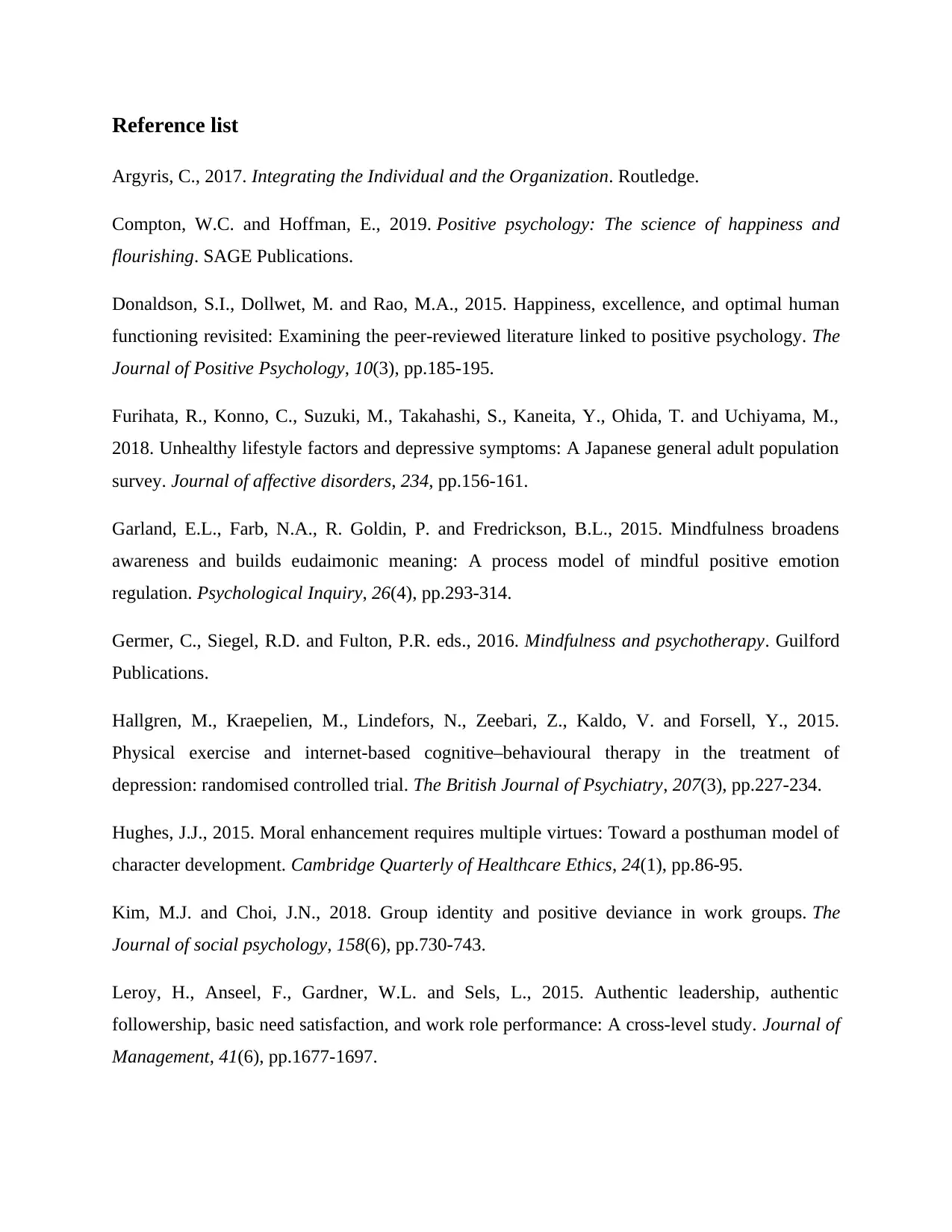
Reference list
Argyris, C., 2017. Integrating the Individual and the Organization. Routledge.
Compton, W.C. and Hoffman, E., 2019. Positive psychology: The science of happiness and
flourishing. SAGE Publications.
Donaldson, S.I., Dollwet, M. and Rao, M.A., 2015. Happiness, excellence, and optimal human
functioning revisited: Examining the peer-reviewed literature linked to positive psychology. The
Journal of Positive Psychology, 10(3), pp.185-195.
Furihata, R., Konno, C., Suzuki, M., Takahashi, S., Kaneita, Y., Ohida, T. and Uchiyama, M.,
2018. Unhealthy lifestyle factors and depressive symptoms: A Japanese general adult population
survey. Journal of affective disorders, 234, pp.156-161.
Garland, E.L., Farb, N.A., R. Goldin, P. and Fredrickson, B.L., 2015. Mindfulness broadens
awareness and builds eudaimonic meaning: A process model of mindful positive emotion
regulation. Psychological Inquiry, 26(4), pp.293-314.
Germer, C., Siegel, R.D. and Fulton, P.R. eds., 2016. Mindfulness and psychotherapy. Guilford
Publications.
Hallgren, M., Kraepelien, M., Lindefors, N., Zeebari, Z., Kaldo, V. and Forsell, Y., 2015.
Physical exercise and internet-based cognitive–behavioural therapy in the treatment of
depression: randomised controlled trial. The British Journal of Psychiatry, 207(3), pp.227-234.
Hughes, J.J., 2015. Moral enhancement requires multiple virtues: Toward a posthuman model of
character development. Cambridge Quarterly of Healthcare Ethics, 24(1), pp.86-95.
Kim, M.J. and Choi, J.N., 2018. Group identity and positive deviance in work groups. The
Journal of social psychology, 158(6), pp.730-743.
Leroy, H., Anseel, F., Gardner, W.L. and Sels, L., 2015. Authentic leadership, authentic
followership, basic need satisfaction, and work role performance: A cross-level study. Journal of
Management, 41(6), pp.1677-1697.
Argyris, C., 2017. Integrating the Individual and the Organization. Routledge.
Compton, W.C. and Hoffman, E., 2019. Positive psychology: The science of happiness and
flourishing. SAGE Publications.
Donaldson, S.I., Dollwet, M. and Rao, M.A., 2015. Happiness, excellence, and optimal human
functioning revisited: Examining the peer-reviewed literature linked to positive psychology. The
Journal of Positive Psychology, 10(3), pp.185-195.
Furihata, R., Konno, C., Suzuki, M., Takahashi, S., Kaneita, Y., Ohida, T. and Uchiyama, M.,
2018. Unhealthy lifestyle factors and depressive symptoms: A Japanese general adult population
survey. Journal of affective disorders, 234, pp.156-161.
Garland, E.L., Farb, N.A., R. Goldin, P. and Fredrickson, B.L., 2015. Mindfulness broadens
awareness and builds eudaimonic meaning: A process model of mindful positive emotion
regulation. Psychological Inquiry, 26(4), pp.293-314.
Germer, C., Siegel, R.D. and Fulton, P.R. eds., 2016. Mindfulness and psychotherapy. Guilford
Publications.
Hallgren, M., Kraepelien, M., Lindefors, N., Zeebari, Z., Kaldo, V. and Forsell, Y., 2015.
Physical exercise and internet-based cognitive–behavioural therapy in the treatment of
depression: randomised controlled trial. The British Journal of Psychiatry, 207(3), pp.227-234.
Hughes, J.J., 2015. Moral enhancement requires multiple virtues: Toward a posthuman model of
character development. Cambridge Quarterly of Healthcare Ethics, 24(1), pp.86-95.
Kim, M.J. and Choi, J.N., 2018. Group identity and positive deviance in work groups. The
Journal of social psychology, 158(6), pp.730-743.
Leroy, H., Anseel, F., Gardner, W.L. and Sels, L., 2015. Authentic leadership, authentic
followership, basic need satisfaction, and work role performance: A cross-level study. Journal of
Management, 41(6), pp.1677-1697.
Secure Best Marks with AI Grader
Need help grading? Try our AI Grader for instant feedback on your assignments.
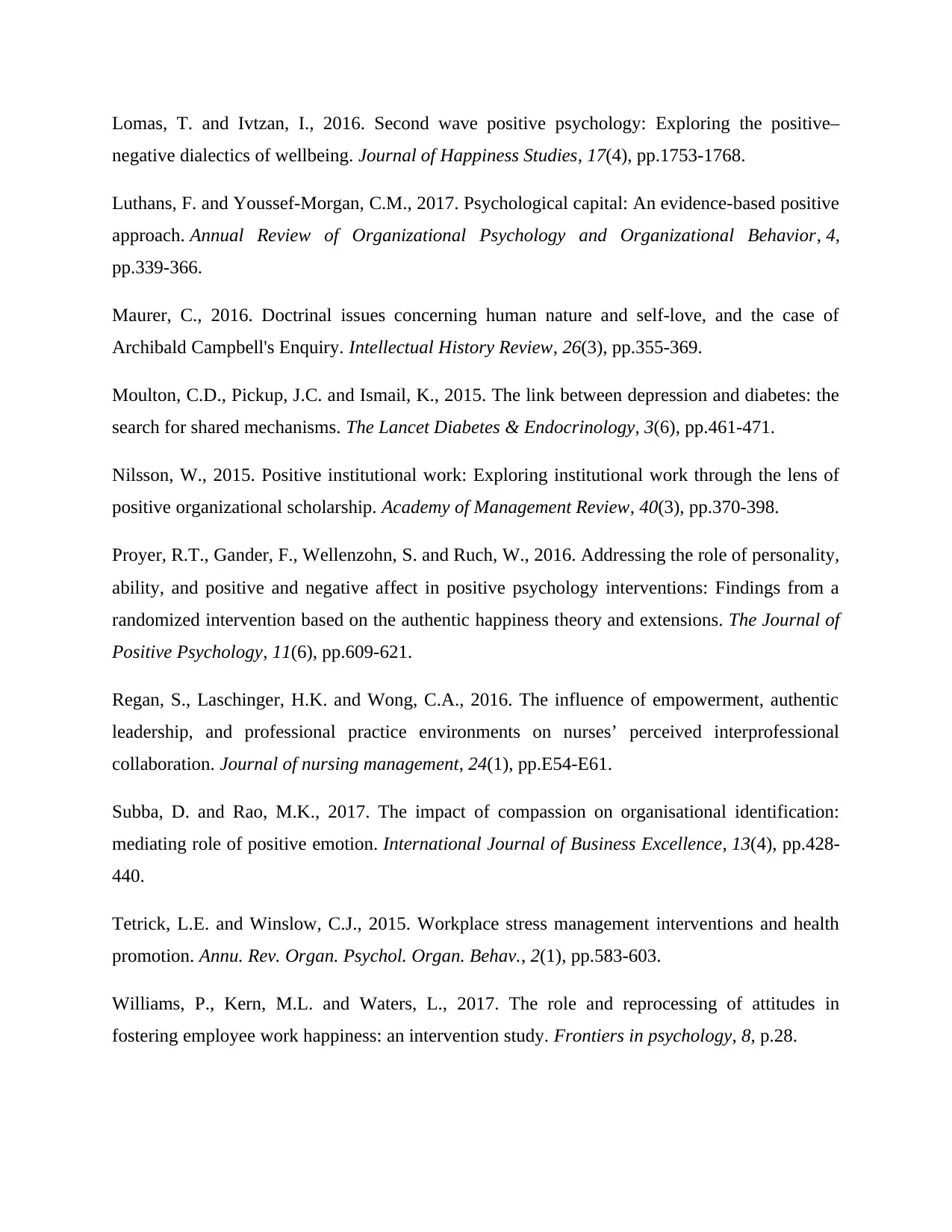
Lomas, T. and Ivtzan, I., 2016. Second wave positive psychology: Exploring the positive–
negative dialectics of wellbeing. Journal of Happiness Studies, 17(4), pp.1753-1768.
Luthans, F. and Youssef-Morgan, C.M., 2017. Psychological capital: An evidence-based positive
approach. Annual Review of Organizational Psychology and Organizational Behavior, 4,
pp.339-366.
Maurer, C., 2016. Doctrinal issues concerning human nature and self-love, and the case of
Archibald Campbell's Enquiry. Intellectual History Review, 26(3), pp.355-369.
Moulton, C.D., Pickup, J.C. and Ismail, K., 2015. The link between depression and diabetes: the
search for shared mechanisms. The Lancet Diabetes & Endocrinology, 3(6), pp.461-471.
Nilsson, W., 2015. Positive institutional work: Exploring institutional work through the lens of
positive organizational scholarship. Academy of Management Review, 40(3), pp.370-398.
Proyer, R.T., Gander, F., Wellenzohn, S. and Ruch, W., 2016. Addressing the role of personality,
ability, and positive and negative affect in positive psychology interventions: Findings from a
randomized intervention based on the authentic happiness theory and extensions. The Journal of
Positive Psychology, 11(6), pp.609-621.
Regan, S., Laschinger, H.K. and Wong, C.A., 2016. The influence of empowerment, authentic
leadership, and professional practice environments on nurses’ perceived interprofessional
collaboration. Journal of nursing management, 24(1), pp.E54-E61.
Subba, D. and Rao, M.K., 2017. The impact of compassion on organisational identification:
mediating role of positive emotion. International Journal of Business Excellence, 13(4), pp.428-
440.
Tetrick, L.E. and Winslow, C.J., 2015. Workplace stress management interventions and health
promotion. Annu. Rev. Organ. Psychol. Organ. Behav., 2(1), pp.583-603.
Williams, P., Kern, M.L. and Waters, L., 2017. The role and reprocessing of attitudes in
fostering employee work happiness: an intervention study. Frontiers in psychology, 8, p.28.
negative dialectics of wellbeing. Journal of Happiness Studies, 17(4), pp.1753-1768.
Luthans, F. and Youssef-Morgan, C.M., 2017. Psychological capital: An evidence-based positive
approach. Annual Review of Organizational Psychology and Organizational Behavior, 4,
pp.339-366.
Maurer, C., 2016. Doctrinal issues concerning human nature and self-love, and the case of
Archibald Campbell's Enquiry. Intellectual History Review, 26(3), pp.355-369.
Moulton, C.D., Pickup, J.C. and Ismail, K., 2015. The link between depression and diabetes: the
search for shared mechanisms. The Lancet Diabetes & Endocrinology, 3(6), pp.461-471.
Nilsson, W., 2015. Positive institutional work: Exploring institutional work through the lens of
positive organizational scholarship. Academy of Management Review, 40(3), pp.370-398.
Proyer, R.T., Gander, F., Wellenzohn, S. and Ruch, W., 2016. Addressing the role of personality,
ability, and positive and negative affect in positive psychology interventions: Findings from a
randomized intervention based on the authentic happiness theory and extensions. The Journal of
Positive Psychology, 11(6), pp.609-621.
Regan, S., Laschinger, H.K. and Wong, C.A., 2016. The influence of empowerment, authentic
leadership, and professional practice environments on nurses’ perceived interprofessional
collaboration. Journal of nursing management, 24(1), pp.E54-E61.
Subba, D. and Rao, M.K., 2017. The impact of compassion on organisational identification:
mediating role of positive emotion. International Journal of Business Excellence, 13(4), pp.428-
440.
Tetrick, L.E. and Winslow, C.J., 2015. Workplace stress management interventions and health
promotion. Annu. Rev. Organ. Psychol. Organ. Behav., 2(1), pp.583-603.
Williams, P., Kern, M.L. and Waters, L., 2017. The role and reprocessing of attitudes in
fostering employee work happiness: an intervention study. Frontiers in psychology, 8, p.28.
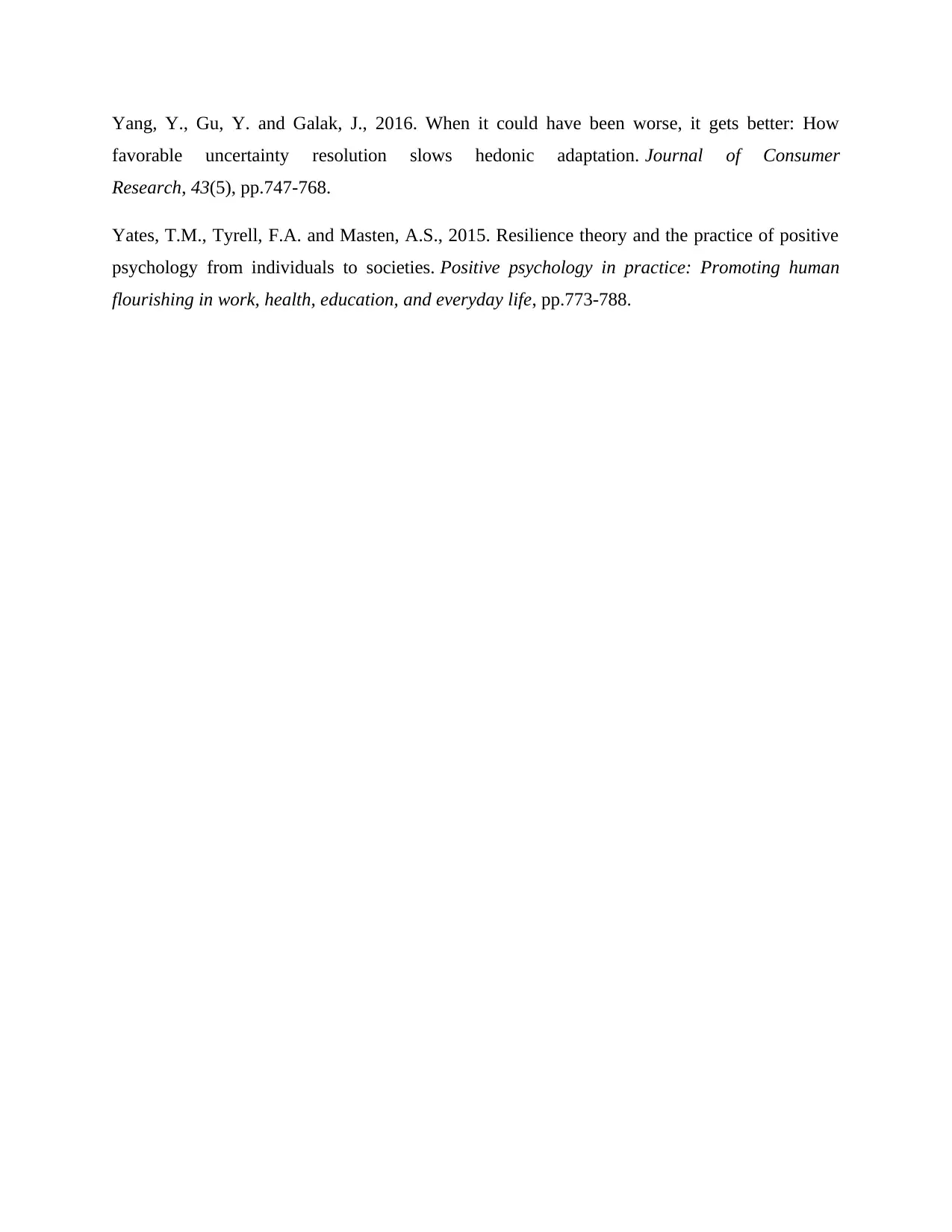
Yang, Y., Gu, Y. and Galak, J., 2016. When it could have been worse, it gets better: How
favorable uncertainty resolution slows hedonic adaptation. Journal of Consumer
Research, 43(5), pp.747-768.
Yates, T.M., Tyrell, F.A. and Masten, A.S., 2015. Resilience theory and the practice of positive
psychology from individuals to societies. Positive psychology in practice: Promoting human
flourishing in work, health, education, and everyday life, pp.773-788.
favorable uncertainty resolution slows hedonic adaptation. Journal of Consumer
Research, 43(5), pp.747-768.
Yates, T.M., Tyrell, F.A. and Masten, A.S., 2015. Resilience theory and the practice of positive
psychology from individuals to societies. Positive psychology in practice: Promoting human
flourishing in work, health, education, and everyday life, pp.773-788.
1 out of 12
Related Documents
Your All-in-One AI-Powered Toolkit for Academic Success.
+13062052269
info@desklib.com
Available 24*7 on WhatsApp / Email
![[object Object]](/_next/static/media/star-bottom.7253800d.svg)
Unlock your academic potential
© 2024 | Zucol Services PVT LTD | All rights reserved.




